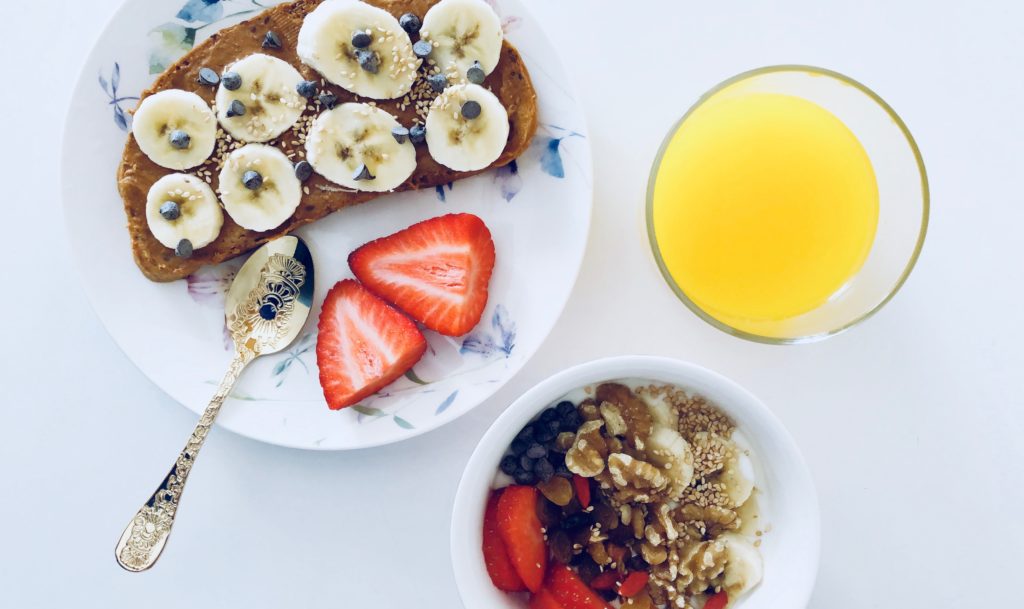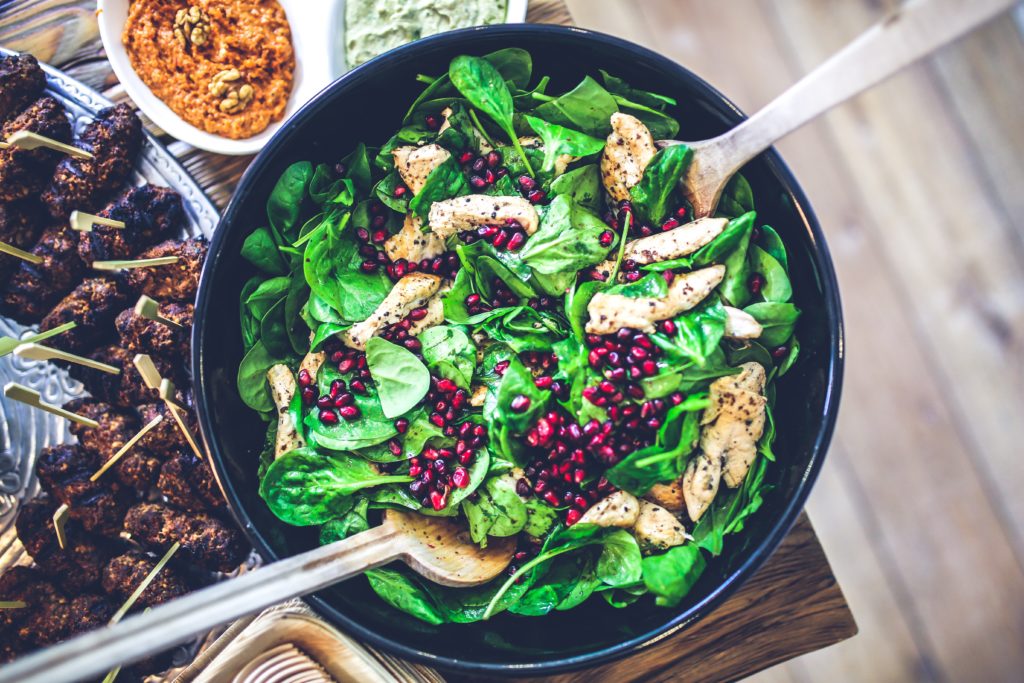FOOD FOR THE POSTPARTUM MOOD
The clock strikes 3PM. The tiny, warm, newborn bundle of joy in your arms has finally settled down and dozed off to sleep. A moment of peace surrounds you when all of a sudden you realize you haven’t had anything to eat all day! No wonder you’re exhausted! (you know, aside from the fact that your bundle of joy was only seconds ago a bundle of screaming). If you’ve ever been so busy that you’ve forgotten to indulge in your basic physical needs, you’ll completely understand this phenomenon. And now with a newborn it’s even easier for this to happen! Well have no fear.
Here are a couple tips and tricks to keep up on your postpartum nutrition even when your tiny bundle is keeping you busy:
-
Eat when you can! Parenthood can be incredibly hectic, especially those first few months postpartum while you’re getting used to your new role and routine. So whenever you have a moment, whether it’s while baby is napping or skin-to-skin during feeding, try munching on a snack. Not only will that keep up your energy for when baby’s especially fussy, but it’ll also improve your milk supply if breastfeeding/chestfeeding is part of your plan!
-
Snack snack snack! With a new baby it’s common not to have the time or energy to prepare full meals on a regular basis. We highly recommend snacking many times throughout the day, not only out of convenience, but because it’s more effective at keeping your blood sugar up as the day goes on. Parents that breastfeed/chestfeed are much more likely to have blood sugar crashes due to so much of their bodily nutrients going to their milk supply, so please make sure to snack if your tiny human is suckling away!
-
Overstock your favorite foods. If there’s a food you’re always in the mood for, don’t be afraid to overstock! Your body will be working overtime to heal after your baby’s birth. So this is a fool-proof way to make sure you’re providing your body with the energy it needs to heal, especially if your appetite is being funky as you adjust.
-
Foods that are easy to eat with one hand. Convenience is key! Leaving some one-handed snacks on the counter so you can grab a few grapes as you walk by can make things SO much easier.
-
Stash non-perishables around the house so you don’t have to get up. End up having an unexpected moment of peace but don’t want to disturb your little one by moving? Good thing you stashed those granola bars in the drawer next to your sofa so that you don’t even have to move to grab a bite!
-
Stock up on foods that require minimum prep. Again, convenience is key. Save your energy for those times when your baby doesn’t want to settle down! Protip: precut fruits and veggies are a godsend.
-
Have your support people (e.g. your doula, significant other, friends, family, etc..) prepare food for you!
-
Prepare and freeze meals before you go into labor. Meal planning before your tiny human arrives can be a lifesaver. By making and freezing nutrient-dense meals ahead of time, you’ll be able to just throw that healthy meal in the microwave while folding clothes or changing baby’s diaper. Easy peasy!
Need some ideas for low-maintenance healthy postpartum snacks? We got you 🙂
- Precut fruits and veggies
- Blueberries
- Grapes
- Crackers
- Nuts
- Nut butters
- Popcorn
- Pre sliced cheese/ string cheese
- Greek yogurt
- Granola
- Protein bars
- Dried fruit
- Hummus
Here are some additional postpartum nutrition tidbits to keep in mind to ensure you’re on your way to feeling your strongest:
- Nutrient dense foods for the first few months. A healthy, nutrient-rich diet is one of the biggest deciding factors in healing and gaining your strength back after birth. Instead of defaulting to quick and easy processed foods (although a little dessert never hurt anyone 😉 ), make sure you’re doing everything you can to nourish your body with each bite! You just carried a baby in your body for 9 months, and now it’s time to take care of you too. If nursing is part of your postpartum plan, it’s also important to remember that your baby eats everything you eat, and you both deserve the absolute best in your tummies.
- Protein-rich foods: Eating more of these foods will not only help strengthen your body, but will also facilitate tissue healing/repair which is vital after birth. This is especially the case after C-sections or physically traumatic births. Examples of these foods: cheese, yogurt, meat, beans, nuts, eggs.
- Healthy whole-grain carbs. After your little one has arrived it’s super tempting to switch gears to losing that “baby weight” as soon as possible, but losing it too fast can interfere with your ability to produce milk and leave you feeling fatigued. Investing in some whole-grain carbs is an easy way to keep your energy up as well as provide that extra boost to your milk supply if your’e breastfeeding/chestfeeding!
- Foods that promote collagen-formation. When it comes to collagen-formation Vitamin C, beta carotene, and zinc are must-haves. Collagen promotes the healing of skin and tissue. Vitamin C and zinc also boost your immune system to prevent common illnesses! Examples: carrots, sweet potatoes, red meat, citrus fruits.
- Leafy greens. Let’s not forget those leafy greens because they’re a fantastic source of iron and Vitamin A! Vitamin A promotes the formation/maintenance of bones, teeth, soft tissues, mucus membranes, white blood cells, and the immune system. This is especially important for new parents, and even more so for new babies. Don’t worry, nursing babies get all of this good stuff from breast milk!
- Vitamin B-12. This one’s a biggie. Vitamin B-12 is involved in the metabolism reactions that occur in every single cell of the human body because it helps break down nutrients and enhances nervous system function. Making sure you’re getting adequate amounts of B-12 can improve your postpartum healing experience 10-fold, and also decreases the likelihood of postpartum depression and anxiety. Breastfeeding/chestfeeding parents also need extra B-12 because it facilitates healthy brain and red blood cell function/development for both the parent and baby. Examples: lean beef, yogurt, cheese, eggs.
- Fiber. In your postpartum life you will find there will already be a lot going on down there. No need to add constipation to the mix 🙂
- Iron. Anemia is pretty common during and after pregnancy because extra hemoglobin and red blood cells are needed to bring oxygen/nutrients to your baby before they’re born. By getting enough iron, you’re also replenishing your red blood cells! Examples: lentils, leafy greens, lean beef, dark beans.
- Hydration nation. Your body is mostly water, so drink up! Plus, water decreases constipation. Need we say more? 🙂
Now let’s nourish that postpartum body!


